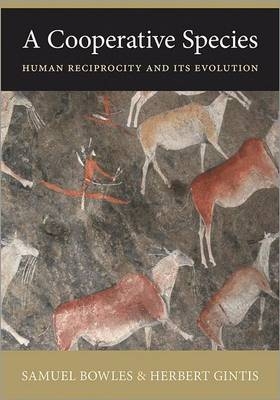
A Cooperative Species
Princeton University Press (Verlag)
978-0-691-15125-0 (ISBN)
- Titel ist leider vergriffen;
keine Neuauflage - Artikel merken
Why do humans, uniquely among animals, cooperate in large numbers to advance projects for the common good? Contrary to the conventional wisdom in biology and economics, this generous and civic-minded behavior is widespread and cannot be explained simply by far-sighted self-interest or a desire to help close genealogical kin. In "A Cooperative Species", Samuel Bowles and Herbert Gintis - pioneers in the new experimental and evolutionary science of human behavior - show that the central issue is not why selfish people act generously, but instead how genetic and cultural evolution has produced a species in which substantial numbers make sacrifices to uphold ethical norms and to help even total strangers. The authors describe how, for thousands of generations, cooperation with fellow group members has been essential to survival. Groups that created institutions to protect the civic-minded from exploitation by the selfish flourished and prevailed in conflicts with less cooperative groups.
Key to this process was the evolution of social emotions such as shame and guilt, and our capacity to internalize social norms so that acting ethically became a personal goal rather than simply a prudent way to avoid punishment. Using experimental, archaeological, genetic, and ethnographic data to calibrate models of the coevolution of genes and culture as well as prehistoric warfare and other forms of group competition, "A Cooperative Species" provides a compelling and novel account of how humans came to be moral and cooperative.
Samuel Bowles heads the Behavioral Sciences Program at the Santa Fe Institute and teaches economics at the University of Siena. Herbert Gintis holds faculty positions at the Santa Fe Institute, Central European University, and the University of Siena.
Preface xi Chapter 1: A Cooperative Species 1 Chapter 2: The Evolution of Altruism in Humans 8 2.1 Preferences, Beliefs, and Constraints 9 2.2 Social Preferences and Social Dilemmas 10 2.3 Genes, Culture, Groups, and Institutions 13 2.4 Preview 18 Chapter 3: Social Preferences 19 3.1 Strong Reciprocity Is Common 20 3.2 Free-Riders Undermine Cooperation 22 3.3 Altruistic Punishment Sustains Cooperation 24 3.4 Effective Punishment Depends on Legitimacy 26 3.5 Purely Symbolic Punishment Is Effective 29 3.6 People Punish Those Who Hurt Others 31 3.7 Social Preferences Are Not Irrational 32 3.8 Culture and InstitutionsMatter 33 3.9 Behavior Is Conditioned on Group Membership 35 3.10 People Enjoy Cooperating and Punishing Free-Riders 38 3.11 Social Preferences in Laboratory and Natural Settings 39 3.12 Competing Explanations 42 Chapter 4: The Sociobiology of Human Cooperation 46 4.1 Inclusive Fitness and Human Cooperation 48 4.2 Modeling Multi-level Selection 52 4.3 EquilibriumSelection 57 4.4 Reciprocal Altruism 59 4.5 Reciprocal Altruism in Large Groups 63 4.6 Reputation: Indirect Reciprocity 68 4.7 Altruism as a Signal of Quality 71 4.8 Positive Assortment 72 4.9 Mechanisms and Motives 75 Chapter 5: Cooperative Homo economicus 79 5.1 Folk Theorems and Evolutionary Dynamics 80 5.2 The Folk Theorem with Imperfect Public Information 83 5.3 The Folk Theorem with Private Information 86 5.4 Evolutionarily Irrelevant Equilibria 87 5.5 Social Norms and Correlated Equilibria 89 5.6 The Missing Choreographer 90 Chapter 6: Ancestral Human Society 93 6.1 Cosmopolitan Ancestors 95 6.2 Genetic Evidence 99 6.3 PrehistoricWarfare 102 6.4 The Foundations of Social Order 106 6.5 The Crucible of Cooperation 110 Chapter 7: The Coevolution of Institutions and Behaviors 111 7.1 Selective Extinction 115 7.2 Reproductive Leveling 117 7.3 Genetic Differentiation between Groups 120 7.4 Deme Extinction and the Evolution of Altruism 121 7.5 The Australian Laboratory 123 7.6 The Coevolution of Institutions and Altruism 124 7.7 Simulating Gene-Culture Coevolution 126 7.8 Levelers and Warriors 130 Chapter 8: Parochialism, Altruism, andWar 133 8.1 Parochial Altruism and War 135 8.2 The Emergence of Parochial Altruism and War 138 8.3 Simulated and Experimental Parochial Altruism 142 8.4 The Legacy of a Past "Red in Tooth and Claw" 146 Chapter 9: The Evolution of Strong Reciprocity 148 9.1 Coordinated Punishment 150 9.2 Altruistic Punishment in a Realistic Demography 156 9.3 The Emergence of Strong Reciprocity 159 9.4 Why Coordinated Punishment Succeeds 163 9.5 A Decentralized Social Order 164 Chapter 10: Socialization 167 10.1 Cultural Transmission 168 10.2 Socialization and the Survival of Fitness-Reducing Norms 171 10.3 Genes, Culture, and the Internalization of Norms 173 10.4 The Internalized Norm as Hitchhiker 176 10.5 The Gene-Culture Coevolution of a Fitness-Reducing Norm 179 10.6 How Can Internalized Norms Be Altruistic? 180 10.7 The Programmable Brain 183 11 Social Emotions 186 11.1 Reciprocity, Shame, and Punishment 188 11.2 The Evolution of Social Emotions 191 11.3 The "Great Captains of Our Lives" 192 12 Conclusion: Human Cooperation and Its Evolution 195 12.1 The Origins of Human Cooperation 196 12.2 The Future of Cooperation 199 Appendix 201 A1 Altruism Defined 201 A2 Agent-Based Models 202 A3 Game Theory 207 A4 Dynamical Systems 209 A5 The Replicator Dynamic 212 A6 Continuation Probability and Time Discount Factor 213 A7 Alternatives to the Standing Model 214 A8 The Prisoners Dilemma with Public and Private Signals 215 A9 Student and Nonstudent Experimental Subjects 217 A10 The Price Equation 218 A11 Weak Multi-level Selection 222 A12 Cooperation and Punishment with Quorum Sensing 223 References 225 Subject Index 251 Author Index 255
| Erscheint lt. Verlag | 20.6.2011 |
|---|---|
| Zusatzinfo | 39 line illus. 24 tables. |
| Verlagsort | New Jersey |
| Sprache | englisch |
| Maße | 178 x 254 mm |
| Gewicht | 680 g |
| Themenwelt | Sachbuch/Ratgeber ► Beruf / Finanzen / Recht / Wirtschaft ► Bewerbung / Karriere |
| Mathematik / Informatik ► Mathematik | |
| Naturwissenschaften ► Biologie ► Evolution | |
| Sozialwissenschaften ► Ethnologie | |
| Sozialwissenschaften ► Soziologie ► Allgemeines / Lexika | |
| Wirtschaft ► Allgemeines / Lexika | |
| ISBN-10 | 0-691-15125-3 / 0691151253 |
| ISBN-13 | 978-0-691-15125-0 / 9780691151250 |
| Zustand | Neuware |
| Haben Sie eine Frage zum Produkt? |
aus dem Bereich


